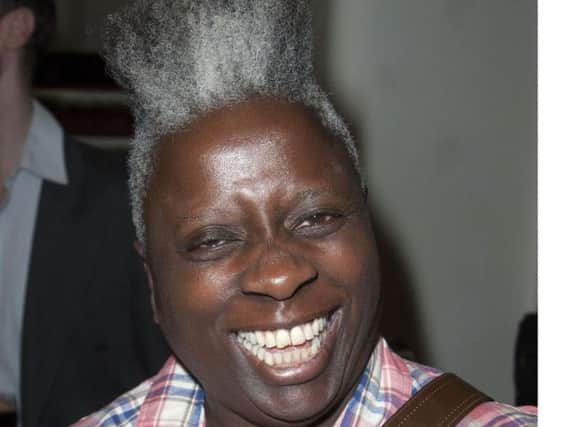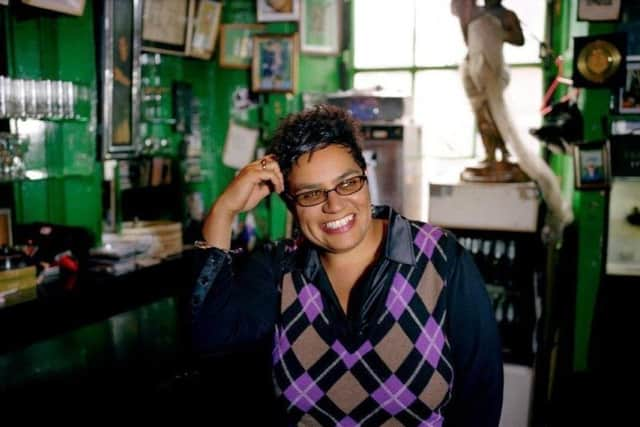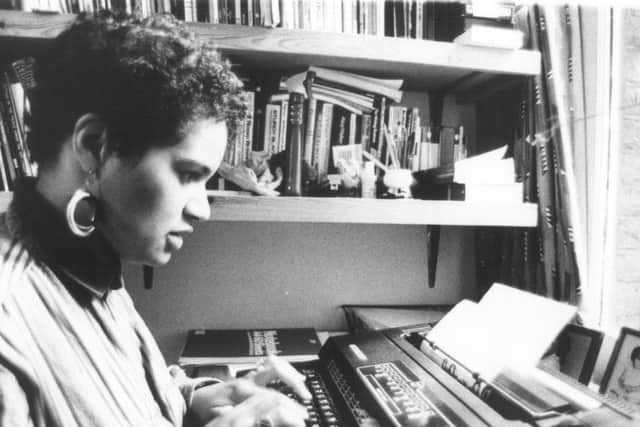Edinburgh Festivals 2019: Bringing Red Dust Road to the stage


When I visit the Red Dust Road rehearsal room, everyone is hard at work. Movement director Vicki Igbowe is at the helm, and the actors are working on the tricky business of saying lines at the same time as remembering dance steps. Composer Tayo Akinbode is orchestrating a complex African rhythm. It’s loud and cheerful and I’m trying to think of the last time I’ve seen such a large and racially diverse cast on stage in Scotland.
The answer is, perhaps, never. But Scots Makar Jackie Kay’s award-winning memoir about about growing up mixed race in Glasgow, and tracing her birth parents – including finding her birth father and his family in Nigeria – is a story which crosses both boundaries and continents.


Advertisement
Hide Ad“I love telling big stories,” says director Dawn Walton, laughing her characteristically big laugh. “I wanted it to be even bigger! I told the National Theatre of Scotland I wanted 20 actors, and they looked at me slightly strangely. But it’s a massive story, it’s 40 years, and it involves a lot of people.”
Walton, the outgoing artistic director of black-led theatre company Eclipse, says she thrives on a challenge. “I read the book and loved it, but I had no idea how we were going to make it into a piece of theatre. It felt to me like a big jigsaw where there were lots of really beautiful and poignant and important moments, but you wouldn’t see the full journey until you’d put in the final piece. Unfortunately, that’s the kind of thing that draws me in.”
She credits leading playwright Tanika Gupta, who wrote the adaptation, for finding a way not only to adapt Kay’s memoir – a patchwork of time periods and writing styles – but to weave in a number of her poems along the way. NTS bought the rights to the book in 2010 when it first came out, but it has taken until now to assemble the right team, along with actors such as Sasha Frost (Doctors, Holby City) in the role of Jackie, and Elaine C Smith, as Jackie’s adopted mum, Helen. It will be premiered at the Edinburgh International Festival, in a co-production with HOME, Manchester, before touring.
The book struck a chord with readers from the beginning. It’s an adoption story, a gay story, and perhaps, most of all, a story of being mixed race. In Scotland, Kay is black, but in Nigeria, she was shocked to discover she was regarded as white. Dawn says: “People find their ways into this story. On a personal level, all of my nieces and nephews are mixed race, dual heritage, so I’m really interested in that story and I’m not really aware that anybody has taken that story on specifically on a grand scale. I think if you’re going to tell a great story, the more specific you are, the more universal it becomes.”


Frost says the frustration expressed by her character in the play over being asked, wherever she goes, “Where are you really from?” strikes a chord with her own experience. “It’s the most asked question. I get it all the time. Sometimes I’ll explain my whole family tree, but sometimes I’ll be really annoyed and just say ‘I’m from Bristol’. There’s an assumption that there’s only a certain type of person that is British, but we’re in 2019, Britain looks how it looks now, the world is changing.”
“Or is it?” questions Walton, when racist tweets by world leaders remind us that things haven’t changed as much as we would like. “I’m looking for a moment when this play is not timely. We seem to be in these weird cycles where things look like they’re moving on and then suddenly you have Trump and Boris. I think it would have been timely last year or the year before or the year before that. Horribly, I suspect it may be timely for the next ten years again.”
Advertisement
Hide AdEveryone in the rehearsal room is aware of the extra responsibility of telling a story which is not fiction. Frost, who says she has been a “massive fan” of Kay’s work for years, didn’t expect to be introduced to her on the first day of rehearsals. “It was the biggest meet-and-greet I’ve been to in my whole life, about 60 people in the room, and then someone said ‘Jackie’s here’. And Elaine C Smith wasn’t here for the first week, so Jackie volunteered to read Helen, the adopted mum, so I had a scene with her! I was terrified.


"[Telling a true story] is a responsibility, but it’s also my job to bring myself to it. In a way, it’s my story too, I can’t just do a version of her, it has to be what I can bring to what’s on the page.”
Advertisement
Hide AdJackie Kay admits that seeing the production coming together has brought up a whirlwind of emotions. While the NTS adapting her memoir for the stage is “a massive gift and a blessing” it has also been a challenge. The experience is different from the adaptation of her novel, Trumpet, for example, because the subject matter is so personal.
Also, ten years have passed since the book was written, and the story has moved on. “Being adopted, your story actually never ends – that’s true for all of us as human beings, whether we’re adopted or not. Lots of things have happened. I met my Nigerian brothers. My birth mother died – and, at her funeral, they still didn’t want everyone to know who I was, but they did want me read a poem for her. So they introduced me as the National Poet of Scotland but didn’t say that I was her daughter, which is probably the most bizarre experience of my life.”But she feels the play has come at a moment which is timely for Scotland, and the UK. “I think it’s particularly important in Scotland because there are not many representations of black people in Scotland, particularly not of my age – I’m 57. The story of my generation of Scottish black people hasn’t really been told.
“I go all over Scotland as the national poet, and I’m really struck by how many people of colour there are in Scotland and how at ease that feels compared to when I was growing up. There’s a different temperature in Scotland, generally. It now feels a more different country from England than ever. I know so many people in England who are considering moving to Scotland because they are sick of the English political landscape.
“If I think about all the other changes that have happened in the last 20 years, it’s phenomenal. Scotland is now the most gay-friendly country in the whole of Europe – that’s off the scale! We’ve come a long way since I was in art class and with some girl saying ‘Miss! Miss! Jackie’s a lezzy!’ and the teacher turning round and saying: ‘Well, are you Jacqueline? Are you a lesbian?’ I’m very proud of my country.”
Red Dust Road is at the Royal Lyceum Theatre, 14-18 August as part of Edinburgh International Festival's You Are Here Programme